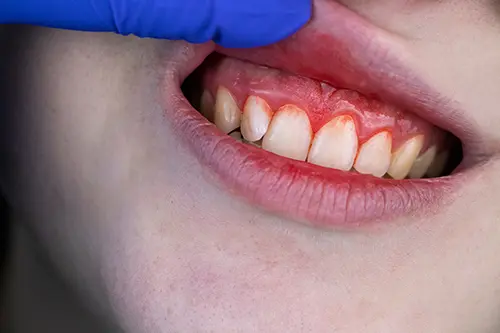Reviewed by Dr. Kerri Font, DDS
Reading time: four minutes

Stress is a part of our daily life. Deadlines, constant notifications, and the never-ending to-do list all take their toll. You already know stress can trigger headaches or raise your blood pressure, but did you know that it can also affect your oral health?
In this blog, you will learn about the latest research connecting stress to gum health, the biological pathways behind it, and the warning signs you should never ignore.
Table of Contents
- Stress Is a Proven Risk Factor for Gum Disease
- Don’t Ignore the Warning Signs During Stressful Times
- Schedule a Consultation With a Periodontist in Colorado
- FAQs
Key Takeaway
Stress accelerates gum disease by increasing cortisol levels and fueling inflammation, making your gums more vulnerable to infection, plaque buildup, and damage. Prioritize oral hygiene, stress management, and professional periodontal health care to ensure your smile stays healthy even during life’s most stressful seasons.
Stress Is a Proven Risk Factor for Gum Disease
Stress does not cause gum disease on its own, but it can make the condition more aggressive. Gum disease begins with bacteria and plaque, yet when stress is added, your body’s defenses weaken and inflammation intensifies. The result is gum disease that advances more quickly and becomes more difficult to control, raising the risk of serious damage to your teeth and gums.
Recent research makes this connection clear. A 2025 study in the Journal of Clinical Medicine [1] examined patients with severe periodontitis and confirmed that stress triggers a harmful chain reaction in the body that directly impacts gum health.
Pathway 1: The Hormonal Connection (The Cortisol Effect)
Chronic stress causes your body to release large amounts of cortisol, the hormone most closely linked to stress. The study mentioned above found that people with advanced gum disease had much higher cortisol levels than those with healthy gums.
Too much cortisol harms gum health in two key ways:
- It weakens your immune system, making it harder to fight off the bacteria that trigger gum disease.
- It fuels bacterial growth, giving harmful oral bacteria an advantage and reducing the protective role of saliva.
Together, these effects make your gums more vulnerable and allow gum disease to progress more quickly.
Pathway 2: The Inflammatory Response (Your Body in Overdrive)
Stress doesn’t just weaken your defenses, it also intensifies your body’s inflammatory response. The same research found that people under chronic stress had higher levels of pro-inflammatory markers, such as Interleukin-1β, in their saliva.
When bacteria begin to irritate the gums, this stress-driven inflammation can escalate the problem. Instead of containing the infection, the heightened response accelerates tissue damage, leading to bone loss, bleeding gums, and advanced periodontal disease that requires professional treatment.
Don’t Ignore the Warning Signs During Stressful Times
Periods of high stress can make your gums more vulnerable, so it is important to watch for early changes in your oral health. Signs to look for include:
- Gums that bleed when brushing or flossing
- Redness or swelling in one or more areas
- Persistent bad breath or mouth sores that return during stressful periods
- Receding gums or a dry mouth, both of which increase the risk of tooth decay
Schedule a Consultation With a Periodontist in Colorado
If you are going through a stressful period and have noticed changes in your gum health, now is the time to act. A periodontal specialist can diagnose the problem, provide advanced periodontal treatment, and protect your long-term oral health.
At Highlands Ranch Periodontics & Dental Implants, Dr. Mike Norouzinia, DDS, and Dr. Kerri Font, DDS, stay at the forefront of science to deliver the most effective gum care possible.
We welcome patients at both of our Colorado locations:
- Highlands Ranch office: 9090 S Ridgeline Blvd. #225, Highlands Ranch, CO 80129. Call (303) 683-1144 to schedule your visit.
- Sloan’s Lake office: 1525 North Raleigh Street Suite 130, Denver, CO 80204. Call (303) 683-1144 for an appointment.
FAQs
In its earliest stage (gingivitis), gum disease can be reversed with professional cleanings, good dental hygiene, and consistent oral care. Once it progresses to periodontitis, the damage to bone and connective tissue cannot be fully reversed. However, with treatments such as scaling and root planing and ongoing periodontal therapy, the disease can be controlled, and further damage can be prevented.
The earliest signs include bleeding gums when brushing or flossing, persistent bad breath, swelling, or gums that look darker or more red than usual. Receding gums and tooth sensitivity are also common indicators.
The rate varies from person to person. In some cases, gum disease can remain mild for years, while in others it may advance quickly, especially during periods of high stress or if oral hygiene is inconsistent. Regular checkups are the best way to monitor changes.
Focus on consistent oral hygiene, such as brushing twice daily with a soft-bristled toothbrush, flossing once a day, and using antimicrobial rinses. Beyond that, stress management is essential. Incorporate relaxation techniques, physical activity, and better sleep to lower cortisol levels and support gum health.
Highlands Ranch Periodontics & Dental Implants has periodontal offices in both Highlands Ranch and Sloan’s Lake. Call (303) 683-1144 to schedule your appointment at the location most convenient for you.
